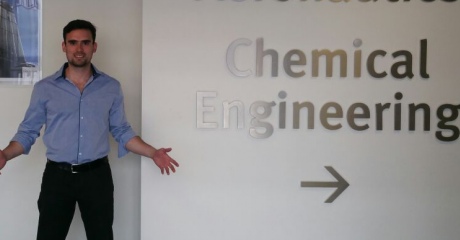Imperial academic discusses his work on algae fuel factories
by Colin Smith

Coaxing bacteria to excrete biofuels is the focus of Imperial research
An Imperial engineer talks about his work in 'coaxing' algae into manufacturing and excreting biofuels on an industrial scale.

Dr Antonio Del Rio Chanona
Dr Antonio Del Rio Chanona from the Department of Chemical Engineering at Imperial College London is working on a new, rapid and cost effective way of creating biofuels. If successful his work may help sectors like the transport industry to reduce its reliance on fossil fuels.
Colin Smith caught up with him to find out more.
What are biofuels?
Conventional biofuels are produced from organic material – biomass – including plant material and organic waste. Traditional biofuel, used mainly in developing countries, include wood, animal dung and charcoal. In more developed countries, where more advanced and efficient conversion technologies are available, biofuels can be made from wood, crops and waste material. These forms of biofuels are converted into either solid, gaseous or liquid.
Biofuels have extraordinary potential to replace current fossil fuels in the transportation industry. However, the main issue with them is that they need to be more economically viable.
Are there other types of biofuels being developed?
Scientists are experimenting with getting some types of algae and bacteria to produce biofuels.
So far they’ve shown that algae, such as Chlamydomonas, and cyanobacteria, such as Cyanothece, can produce hydrogen fuel. Botryococcus algae can produce the hydrocarbon-based fuel biodiesel.
What are the drawbacks with these new approaches?
For biodiesel production, algae produce a fuel precursor called biolipid, which is accumulated inside algae cells.
To extract these biolipids, a series of separation procedures must be performed to break the cells apart so that the biolipid can be extracted for further refining. For industry, this separation process is over 20 per cent of the investment cost, which is huge.
What are excretable biofuels?
These are newly proposed types of biofuels. Different types of algae and bacteria could be ‘programed’ to ‘manufacture’ microscopic amounts of biofuels and excrete them into a solution.
Excreting the fuel would mean that there is no extraction process involving crushing the cells. This would make the separation procedure much less energy intensive and therefore more cost effective.
What will your work focus on?
I am collaborating with the research group led by Professor Klaus Hellgardt, from Imperial’s Department of Chemical Engineering.
They are experimenting with several genetically modified types of algae in excretable biofuels production.
My research will focus on three particular algae strains: Cyanothece sp., Synechocystis sp, Chlamydomonas.
What type of biofuels are you hoping to produce?
Biohydrogen which is a clean transport fuel, biobutanol, which is a replacement of gasoline, and biohydrocarbon, which is an alternative to diesel.
How far how you got with the research?
So far, I have been working on biohydrogen and biohydrocarbon production. I have constructed different computer models and developed strategies to enhance the algae’s ability to produce these biofuels.
Can you explain what types of industries would benefit most from these biofuels?
Energy firms would be the main beneficiaries from these technologies. Also, companies using algae to produce animal feed and food supplements can also get benefits by getting them to co-produce biofuels along with their primary products.
Can you estimate how long it would take for this to become a viable source of energy?
The European Union has launched a policy of using biofuels to support ten per cent of transport energy by 2020.
The European Algal Biomass Association has projected that the transition from laboratory experiments to industrial scale production of biofuels made from algae will happen within 10 years.
Article text (excluding photos or graphics) © Imperial College London.
Photos and graphics subject to third party copyright used with permission or © Imperial College London.
Reporter
Colin Smith
Communications and Public Affairs